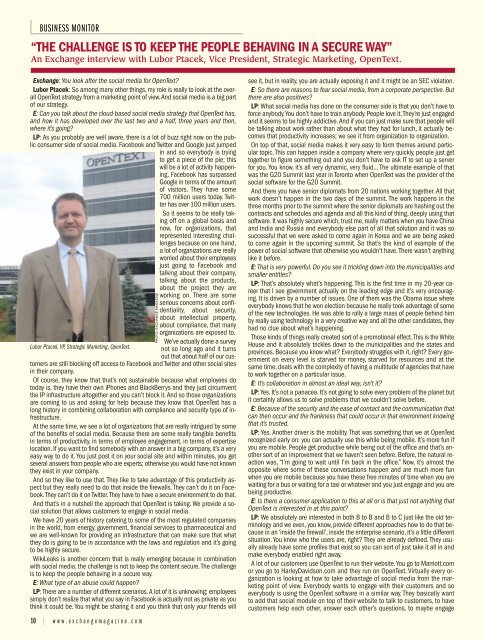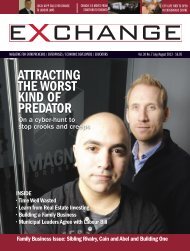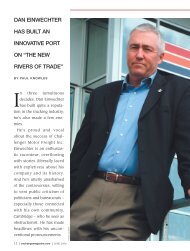PDF Download - Exchange Magazine
PDF Download - Exchange Magazine
PDF Download - Exchange Magazine
- No tags were found...
Create successful ePaper yourself
Turn your PDF publications into a flip-book with our unique Google optimized e-Paper software.
BUSINESS MONITOR“THE CHALLENGE IS TO KEEP THE PEOPLE BEHAVING IN A SECURE WAY”An <strong>Exchange</strong> interview with Lubor Ptacek, Vice President, Strategic Marketing, OpenText.<strong>Exchange</strong>: You look after the social media for OpenText?Lubor Ptacek: So among many other things, my role is really to look at the overallOpenText strategy from a marketing point of view.And social media is a big partof our strategy.E: Can you talk about the cloud-based social media strategy that OpenText has,and how it has developed over the last two and a half, three years and then,where it’s going?LP: As you probably are well aware, there is a lot of buzz right now on the publicconsumer side of social media. Facebook and Twitter and Google just jumpedin and so everybody is tryingto get a piece of the pie; thiswill be a lot of activity happening.Facebook has surpassedGoogle in terms of the amountof visitors. They have some700 million users today. Twitterhas over 100 million users.So it seems to be really takingoff on a global basis andnow, for organizations, thatrepresented interesting challengesbecause on one hand,a lot of organizations are reallyworried about their employeesjust going to Facebook andtalking about their company,talking about the products,about the project they areworking on. There are someserious concerns about confidentiality,about security,about intellectual property,about compliance, that manyLubor Ptacek, VP, Strategic Marketing, OpenText.10 | w w w . e x c h a n g e m a g a z i n e . c o morganizations are exposed to.We’ve actually done a surveynot so long ago and it turnsout that about half of our customersare still blocking off access to Facebook and Twitter and other social sitesin their company.Of course, they know that that’s not sustainable because what employees dotoday is, they have their own iPhones and BlackBerrys and they just circumventthe IP infrastructure altogether and you can’t block it.And so those organizationsare coming to us and asking for help because they know that OpenText has along history in combining collaboration with compliance and security type of infrastructure.At the same time, we see a lot of organizations that are really intrigued by someof the benefits of social media. Because there are some really tangible benefitsin terms of productivity, in terms of employee engagement, in terms of expertiselocation. If you want to find somebody with an answer in a big company, it’s a veryeasy way to do it. You just post it on your social site and within minutes, you getseveral answers from people who are experts; otherwise you would have not knownthey exist in your company.And so they like to use that. They like to take advantage of this productivity aspectbut they really need to do that inside the firewalls.They can’t do it on Facebook.Theycan’t do it on Twitter.They have to have a secure environment to do that.And that’s in a nutshell the approach that OpenText is taking. We provide a socialsolution that allows customers to engage in social media.We have 20 years of history catering to some of the most regulated companiesin the world, from energy, government, financial services to pharmaceutical andwe are well-known for providing an infrastructure that can make sure that whatthey do is going to be in accordance with the laws and regulation and it’s goingto be highly secure.WikiLeaks is another concern that is really emerging because in combinationwith social media, the challenge is not to keep the content secure.The challengeis to keep the people behaving in a secure way.E: What type of an abuse could happen?LP: There are a number of different scenarios.A lot of it is unknowing; employeessimply don’t realize that what you say in Facebook is actually not as private as youthink it could be. You might be sharing it and you think that only your friends willPHOTO: EXCHANGE MAGAZINEsee it, but in reality, you are actually exposing it and it might be an SEC violation.E: So there are reasons to fear social media, from a corporate perspective. Butthere are also positives?LP: What social media has done on the consumer side is that you don’t have toforce anybody.You don’t have to train anybody. People love it.They’re just engagedand it seems to be highly addictive.And if you can just make sure that people willbe talking about work rather than about what they had for lunch, it actually becomesthat productivity increases; we see it from organization to organization.On top of that, social media makes it very easy to form themes around particulartopic.This can happen inside a company where very quickly, people just gettogether to figure something out and you don’t have to ask IT to set up a serverfor you. You know, it’s all very dynamic, very fluid... The ultimate example of thatwas the G20 Summit last year in Toronto when OpenText was the provider of thesocial software for the G20 Summit.And there you have senior diplomats from 20 nations working together. All thatwork doesn’t happen in the two days of the summit. The work happens in thethree months prior to the summit where the senior diplomats are hashing out thecontracts and schedules and agenda and all this kind of thing, deeply using thatsoftware. It was highly secure which, trust me, really matters when you have Chinaand India and Russia and everybody else part of all that solution and it was sosuccessful that we were asked to come again in Korea and we are being askedto come again in the upcoming summit. So that’s the kind of example of thepower of social software that otherwise you wouldn’t have.There wasn’t anythinglike it before.E: That is very powerful. Do you see it trickling down into the municipalities andsmaller entities?LP: That’s absolutely what’s happening. This is the first time in my 20-year careerthat I see government actually on the leading edge and it’s very encouraging.It is driven by a number of issues. One of them was the Obama issue whereeverybody knows that he won election because he really took advantage of someof the new technologies. He was able to rally a large mass of people behind himby really using technology in a very creative way and all the other candidates, theyhad no clue about what’s happening.Those kinds of things really created sort of a promotional effect.This is the WhiteHouse and it absolutely trickles down to the municipalities and the states andprovinces. Because you know what? Everybody struggles with it, right? Every governmenton every level is starved for money, starved for resources and at thesame time, deals with the complexity of having a multitude of agencies that haveto work together on a particular issue.E: It’s collaboration in almost an ideal way, isn’t it?LP: Yes. It’s not a panacea. It’s not going to solve every problem of the planet butit certainly allows us to solve problems that we couldn’t solve before.E: Because of the security and the ease of contact and the communication thatcan then occur and the frankness that could occur in that environment knowingthat it’s trusted.LP: Yes. Another driver is the mobility. That was something that we at OpenTextrecognized early on: you can actually use this while being mobile. It’s more fun ifyou are mobile. People get productive while being out of the office and that’s anothersort of an improvement that we haven’t seen before. Before, the natural reactionwas, “I’m going to wait until I’m back in the office.” Now, it’s almost theopposite where some of these conversations happen and are much more funwhen you are mobile because you have these free minutes of time when you arewaiting for a bus or waiting for a taxi or whatever and you just engage and you arebeing productive.E: Is there a consumer application to this at all or is that just not anything thatOpenText is interested in at this point?LP: We absolutely are interested in both B to B and B to C just like the old terminologyand we even, you know, provide different approaches how to do that becausein an ‘inside the firewall’, inside the enterprise scenario, it’s a little differentsituation.You know who the users are, right? They are already defined.They usuallyalready have some profiles that exist so you can sort of just take it all in andmake everybody enabled right away.A lot of our customers use OpenText to run their website.You go to Marriott.comor you go to HarleyDavidson.com and they run on OpenText. Virtually every organizationis looking at how to take advantage of social media from the marketingpoint of view. Everybody wants to engage with their customers and soeverybody is using the OpenText software in a similar way. They basically wantto add that social module on top of their website to talk to customers, to havecustomers help each other, answer each other’s questions, to maybe engage
















